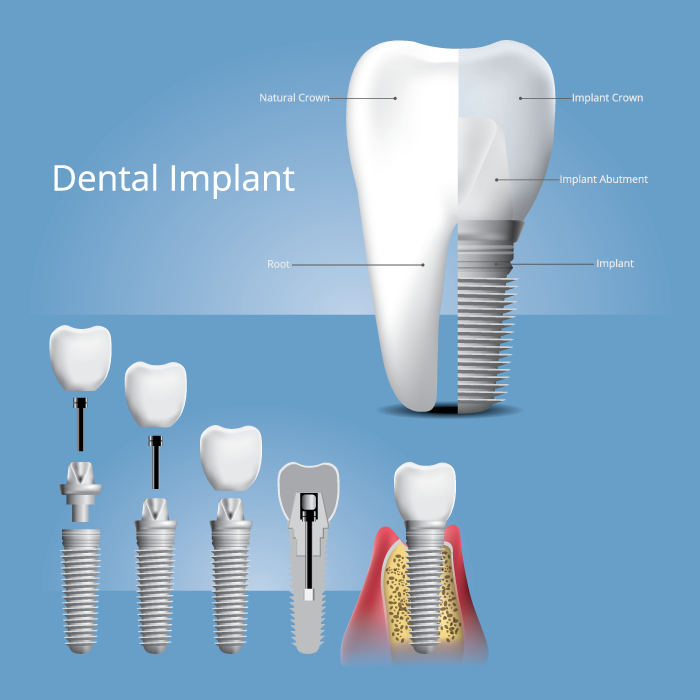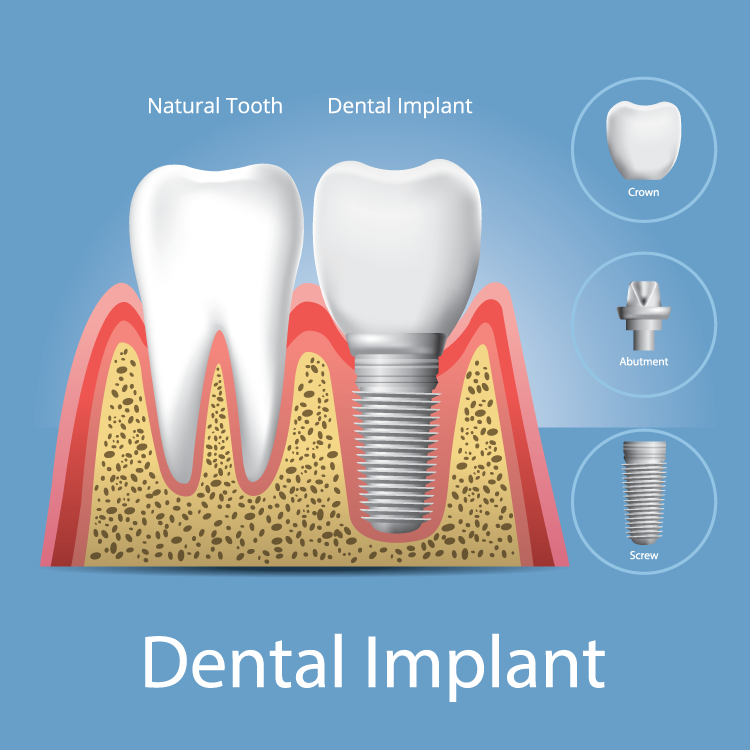WHAT ARE DENTAL IMPLANTS?
Permanent solution for tooth loss
Dental implants represent a common procedure of permanently replacing missing teeth without affecting neighboring teeth.
With the help of dental implants, we can fully remedy toothlessness and thus strongly improve chewing and speaking abilities as well as restore a beautiful smile. Implants can also serve as carriers of a fixed dental bridge or denture.

What is a Dental Implant?
When a tooth is lost the specialized bony process that houses the tooth begins to resorb due to lack of stimulation. This causes a decrease in width and height of the bone in the area the tooth is lost. Neighboring teeth and opposing teeth begin to move into the space. This causes food lodgment, subsequent decay, gum disease and abnormal forces being transmitted to teeth leading to fracture of cusps which may necessitate root canal treatment or extraction. Loss of teeth can also cause the cheek and lips to collapse giving an aged look.
The consequences of tooth loss can be prevented by replacing the lost tooth in a timely manner. Although there are several options to replace a missing tooth the number one choice for replacing lost teeth are dental implants. Implants are tiny titanium screws or posts that are surgically placed in the bone. Once integrated into bone they act like roots onto which small posts are attached which protrude through the gums. These posts provide stable anchors to the replacement teeth. Implants maintain the bone height by stimulation and prevents unnecessary trimming of adjoining teeth for bridge placement. Since implants are titanium posts there is no chance for decay on implants. Implants can service you for several years with regular professional cleaning and proper home care.
Many people who are missing a single tooth opt for a fixed bridge; but a bridge may require the cutting down of healthy, adjacent teeth that may or may not need to be restored in the future. Then there is the additional cost of possibly having to replace the bridge once, twice or more over the course of a lifetime due to decay or gum problems affecting the anchor teeth.
Another option to replace missing teeth is a removable partial denture or complete denture depending on the number of teeth missing. The chewing efficiency with a denture is reduced to more than half of that of natural teeth. The teeth that support the partial denture are weakened due to the excessive loads acting on them and eventually are lost. The denture rests on the gum causing tissue abrasion and bone loss. Removable dentures may slip or cause embarrassing clicking sounds while eating or speaking.
Studies show that within five to seven years there is a failure rate of up to 30% in teeth located next to a fixed bridge or removable partial denture.
Who is a candidate for dental implants?
Anyone who is missing one or several teeth is a candidate for implants. With the exception of growing children, dental implants are the solution of choice for people of all ages, even those with the following health concerns:
Existing Medical Conditions: If you can have routine dental treatment, you can generally have an implant placed. While precautions are advisable for certain conditions, patients with such chronic diseases as high blood pressure and diabetes are usually successful candidates for dental implant treatment.
Gum Disease or Problem Teeth: Almost all implants placed in patients who have lost their teeth to periodontal disease or decay has been successful.
Currently Wearing Partials or Dentures: Implants can replace removable bridges or dentures, or they can be used to stabilize and secure the denture, making it much more comfortable.
Smokers: Although smoking lowers the success rate of implants, it doesn’t eliminate the possibility of getting them.
Bone Loss: Bone loss is not uncommon for people who have lost teeth or had periodontal disease. Oral and maxillofacial surgeons are trained and experienced in grafting bone to safely and permanently secure the implant.
Implant tooth replacement in children is usually deferred until their jaw growth is complete. There are, however, some instances when a dental implant may be appropriate, such as when it is part of the child’s orthodontic treatment plan. Your family dentist or orthodontist can guide you in this instance.
What is the Procedure like?
Dental Implant placement usually takes two surgical appointments:
During the first surgical appointment the implant site is prepared to receive the implant following strict aseptic procedures. The selected size of the implant is placed in the prepared site. The gum tissue is sutured over the implant. The implant takes 4- 6 months to fuse with the bone.
During the second surgical appointment the implant is uncovered and the appropriate post is attached to which the replacement tooth is anchored. An impression of the post is taken and sent to the lab for the fabrication of the implant crown. During this time a temporary crown is placed. Once the final crown is back it is cemented with permanent cement.

-
Permanent solution
-
Improved chewing and speaking
-
Natural function and look
-
Improved facial appearance
-
Prevention of bone loss
-
No special care required
-
Very sturdy and secure
-
No diet restrictions
-
Can be changed or updated
Top 5 Services
Invisalign Braces
A modern solution of straightening your teeth through clear braces, made specifically to fit your mouth.
Porcelain Veneers
Veneers are an ideal cosmetic solution for everyone who desires a beautiful smile with minimal invasions into their teeth.
Restorative Dentistry
We work passionately toward creating the most youthful smiles for patients whose natural teeth require replacement.
Cosmetic Dentistry
A beautiful smile contributes to a better mood, it affects self-esteem, and it allows us to make a good impression on others.
Teeth Whitening
Professional teeth whitening allows us to brighten your smile and wipe away stains.

The Poelman Membership Plan is an annual reduced-fee savings plan for families and individuals without dental insurance coverage that allows all Members to receive quality dental services at greatly reduced prices. Unlike conventional insurance plans, with PMP there are no deductibles, no yearly maximums, and no waiting periods to begin treatment. PMP benefits coverage begins immediately on plan registration.
Benefits include:
• Up to two standard teeth cleanings with fluoride applications per year
• Up to two complete dental examinations with oral cancer evaluations
• Digital Images for annual exam
• A 20% reduction in fees on all dental procedures
• A 50% reduction in fees on sealants up to age 18
• A 50% reduction in fees on custom bleaching trays
Benefits include:
• Up to four standard teeth cleanings with fluoride applications per year
• Up to two complete dental examinations with oral cancer evaluations
• Diagnostic digital images for annual exam
• A 25% reduction in fees on all dental procedures
• A 50% reduction in fees on sealants up to age 18
• A 50% reduction in fees on custom bleaching trays



